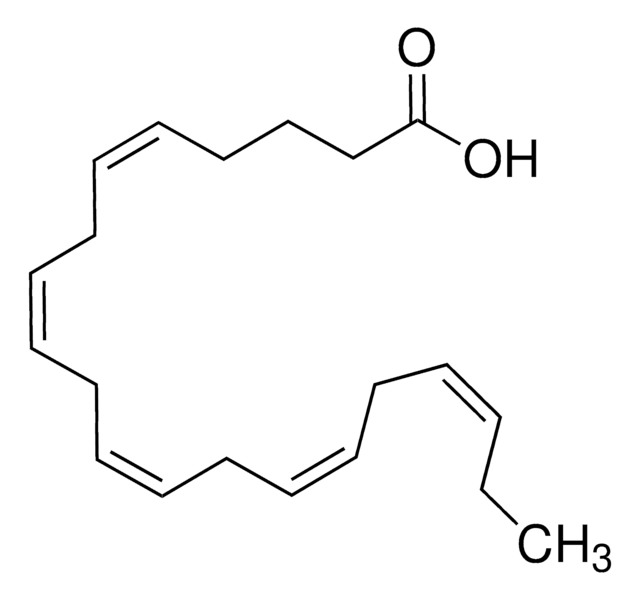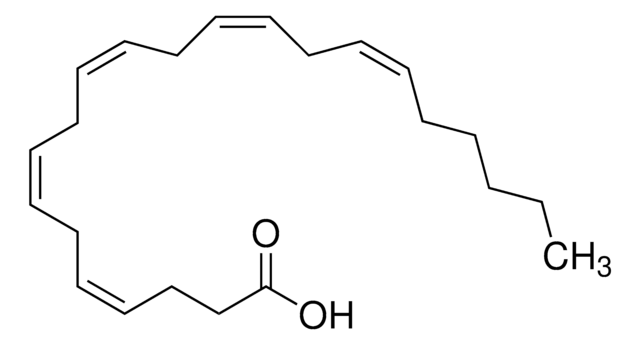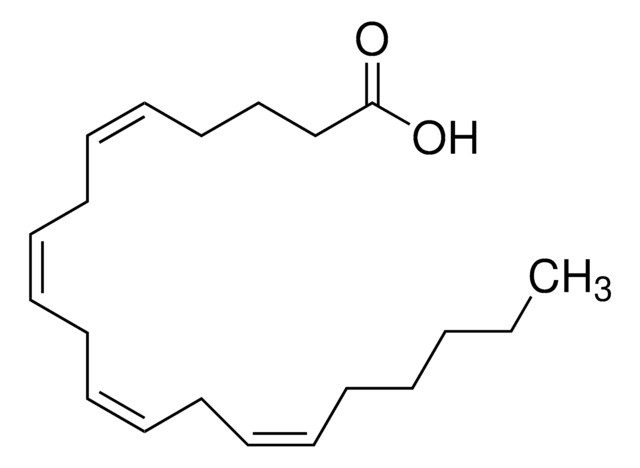44864
cis-5,8,11,14,17-Eicosapentaenoic acid
analytical standard
Synonym(s):
EPA, Timnodonic acid
About This Item
Recommended Products
biological source
fish oil
Quality Level
grade
analytical standard
assay
≥98.5% (GC)
shelf life
limited shelf life, expiry date on the label
technique(s)
HPLC: suitable
gas chromatography (GC): suitable
refractive index
n20/D 1.4977 (lit.)
mp
−54-−53 °C (lit.)
density
0.943 g/mL at 25 °C (lit.)
format
neat
functional group
carboxylic acid
storage temp.
−20°C
SMILES string
CC/C=C\C/C=C\C/C=C\C/C=C\C/C=C\CCCC(O)=O
InChI
1S/C20H30O2/c1-2-3-4-5-6-7-8-9-10-11-12-13-14-15-16-17-18-19-20(21)22/h3-4,6-7,9-10,12-13,15-16H,2,5,8,11,14,17-19H2,1H3,(H,21,22)/b4-3-,7-6-,10-9-,13-12-,16-15-
InChI key
JAZBEHYOTPTENJ-JLNKQSITSA-N
Looking for similar products? Visit Product Comparison Guide
General description
Application
- Optimization of capillary zone electrophoresis procedurecoupled with direct absorption UV detection (CZE-UV) to determine eicosapentaenoicacid and docosahexaenoic acids after their methylation in 10 different samplesof commercial omega-3 supplements
- Simultaneous determination of eicosapentaenoic acid,docosahexaenoic acid, and arachidonic acid in human plasma samples by high-performanceliquid chromatography-electrochemical detection (HPLC-ECD)
- Separation, identification, and quantification of eicosapentaenoicacid, docosahexaenoic acid, and arachidonic acid in human plasma samples by high-performanceliquid chromatography combined with tandem mass spectrometry (HPLC-MS/MS)
Biochem/physiol Actions
Packaging
Other Notes
Storage Class
10 - Combustible liquids
wgk_germany
WGK 3
flash_point_f
200.1 °F - closed cup
flash_point_c
93.4 °C - closed cup
ppe
Faceshields, Gloves, Goggles, type ABEK (EN14387) respirator filter
Choose from one of the most recent versions:
Certificates of Analysis (COA)
Sorry, we don't have COAs for this product available online at this time.
If you need assistance, please contact Customer Support.
Already Own This Product?
Find documentation for the products that you have recently purchased in the Document Library.
Customers Also Viewed
Articles
The potential for the prevention and treatment of cardiovascular disease through increased dietary intake of omega-3 (w-3) fish oils is not a recent scientific discovery.
Our team of scientists has experience in all areas of research including Life Science, Material Science, Chemical Synthesis, Chromatography, Analytical and many others.
Contact Technical Service








